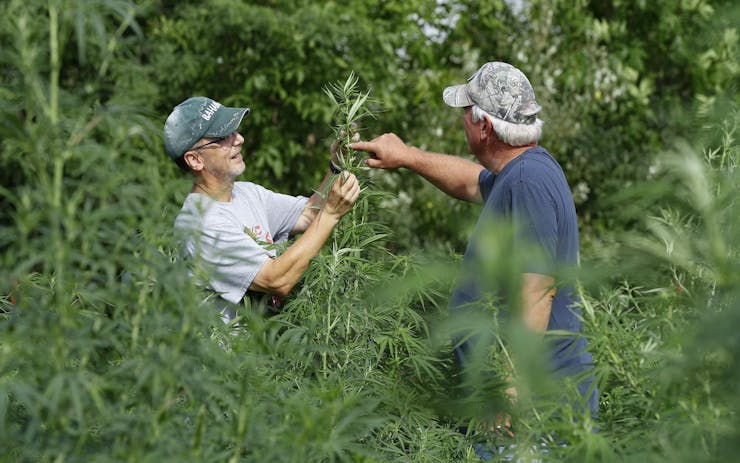Something has gone mysteriously missing from Michigan’s cannabis industry over the last six months: cannabis sales.
Statewide sales hit a peak in July 2020, then began trending downward. What’s going on?
After opening the state’s first adult-use stores in Dec. 2019, Michigan’s cannabis industry saw sales increase month-over-month at a sharp incline. Recreational and medical sales combined for $35 million in revenue in Jan. 2020; by July 2020, the state was recording nearly $110 million in combined monthly sales.
But then something happened.
Sales began to gradually fall. Combined medical and adult-use sales hit $92 million in Nov. 2020, and rebounded only slightly to $101 million in December.
It’s typical for Michigan’s regulated cannabis market to take a small dip between October and December, as the surplus from the autumn outdoor flower harvest hits the unlicensed market. But considering the electric trajectory of the state’s first quarter sales, during which monthly dispensary sales rocketed up $75 million between January and July, it’s difficult to read the sudden industry slump as merely a seasonal hitch.
Could Michigan’s cannabis industry bubble be popping already?
Don’t you know consumption’s going up, up, up, up, up
What’s more puzzling is that while dispensary sales might be down, cannabis consumption has not dropped. By unanimous report among state experts, Michiganders are smoking down now more than ever.
If they’re not buying in stores, where are Michiganders getting their cannabis?
“I’m willing to believe there were less dispensary sales,” says Chris Silva, longtime caregiver and manager of Grand Rapids’ Pharmhouse Wellness dispensary. “But I don’t think that means the actual cannabis consumption level is down. It’s just not happening in the stores.”
This leaves two questions: 1) Why aren’t Michiganders buying as much from licensed stores and dispensaries, and 2) Where are they getting their product?
As always with Michigan’s historically turbid relationship with regulated cannabis: It’s complicated. In the end, consumer sales trends indicate that many cannabis consumers left the regulated market last year to grow their own—a trend which arguably reflects Michigan’s cultural traits of self-sufficiency and self-determination.
Factor 1: COVID economy hit consumers hard
Although licensed cannabis sales did spike briefly in the wake of last spring’s COVID stimulus checks, those sales—like the checks—have not returned.
Industry professionals like Silva and Jamie Cooper of Sensei Connects speculate that low sales correspond with lost wages and the absence of recurring stimulus checks.
Shop highly rated dispensaries near you
Showing you dispensaries nearRobin Schneider, executive director of the Michigan Cannabis Industry Association, takes this theory further. She points to the more than 400,000 tip workers in the state who have been largely unemployed due to COVID. Tip workers like waitstaff, bartenders, hair stylists, and retail counter personnel, she says, are more likely to be cannabis users because they don’t face employment discrimination over cannabis. When those workers lost their paychecks, they also lost money that might have been spent at the local cannabis store.
Factor 2: Poor reviews of licensed products
One of the reasons Michigan’s market prompted early bullish predictions is because of the sophisticated tastes of its core medical consumer base. For nearly the first full decade of medical marijuana legalization, Michigan patients were left to rely on products grown by their designated caregivers. During that time, the state’s caregivers became experts at their craft.
Now that the state has created a fully licensed regulatory framework for both medical and adult-use products, many of the craft-scale caregivers who formerly supplied the state’s patients have been replaced by commercial-scale growers. Some consumers have found that the bud grown from these large-scale, investor-driven operations is inferior to the caregiver product to which Michiganders had grown accustomed.
“People aren’t happy with the quality in the market, so they turn to doing it themselves,” said one grow shop employee.
“The stuff we’ve had access to in Michigan [prior to adult-use legalization] was just some really good stuff,” says Tami VandenBerg, co-founder of the West Michigan Cannabis Guild and a longtime legalization advocate. “So to have these corporate conglomerates come in and offer something at half the quality—and then they don’t have much business…it’s not shocking.”
VandenBerg’s own retail license application, for a store with a business plan that included a focus on hiring locals, was denied by the Grand Rapids city council last May because of objections from a handful of local religious leaders.
Other industry operators place some blame on the state’s strict contaminant requirements, which drive regulated marijuana producers to produce sterile and sometimes even irradiated flower. That manufacturing process can result in poor terpene profiles and low potency. Since last spring, consumer complaints of flavorless and low-potency flower have proliferated on social media.
Factor 3: Competition from the unlicensed market
MINORML and MILegalize board member Rick Thompson blames the “unregulated market” for undercutting sales in state-licensed cannabis stores and dispensaries. He focuses not on out-of-state suppliers but on Michigan-based caregivers who were shut down by the state during the pivot to legal regulation.
“They [the caregivers] had ramped up production to a commercial level,” Thompson says, “and were moving product with the full blessing of the law, and suddenly the agency turned it off. So we had all these people who were used to growing cannabis. Do you think they just stopped? I don’t.”
Anqunette Sarfoh, a cannabis entrepreneur and board member of the Michigan Cannabis Industry Association, agrees that shutting down caregivers “hit provisioning centers really hard. The cost of cannabis skyrocketed.”
Sarfoh’s new line of edibles, which was supposed to launch in August, had to be delayed. “There was a well-established pipeline of caregivers,” she says. “Once that pipeline got cut out of the [regulated] market, they just continued to work the networks they had established. I know that’s how it’s affected me; I can only imagine how it’s affected other people.”
Others point to a certain amount of product coming in from out-of-state, specifically overflow from Oregon and Washington’s supply surplus—and the ease with which cannabis can be transported via USPS and UPS now that the federal ban on hemp has lifted. (Note: sending cannabis via USPS or UPS with THC levels greater than 0.3% remains illegal under federal law.)
Factor 4: Michiganders are growing their own
The final—and perhaps most impactful—factor in the market comes, surprisingly, from the state’s relatively generous home growing laws.
Since late 2018, Michigan has allowed for up to twelve plants to be grown per household for recreational purposes—more than in any other state.
Although industry veterans like Thompson are loathe to acknowledge that home growing could make a sizable impact on regulated sales, Michigan’s cannabis seed suppliers and cannabis grow supply stores are singing a different tune.
“The number of new growers in the market is phenomenal,” says Pete O’Toole, owner of the Michigan Marijuana Seed Club. When O’Toole began his seed business two years ago, it hit the ground running. This year, he says they’re looking to double or triple last year’s profits, projecting $500,000 by the end of 2021.
While O’Toole also points to the illicit market and local caregiver supply as contributing to depressed dispensary sales, he says “more than anything, there are more and more people growing marijuana every single day.” Many of his customers, he adds, are from the boomer generation.
Outdoor growing boom seen in seed stores
Perhaps most surprisingly of all, O’Toole notes that Michiganders are increasingly growing outdoors. Five years ago, he says, 80% to 90% of people who grew their own in Michigan were growing indoors. That ratio has switched.
“With all the genetics that are available these days,” O’Toole says, “people even as far up as the UP are killing it.”
Staff from Lansing and Kalamazoo franchises of the national marijuana grow supply stores HTG confirm that supplies for home cannabis growing have been in supremely high demand.
Seed and grow suppliers report record-breaking sales in Michigan, with no signs of slowing down.
“People aren’t happy with the quality in the market, so they turn to doing it themselves,” a staff member in the Kalamazoo store told me. (The staffer requested anonymity because he was not authorized to speak on behalf of the company.)
Another HTG employee, in Lansing, told me “we couldn’t keep up with demand for soil” in the spring of 2020. “It was incredible, the amount of people we dealt with all summer. Everyone was locked in their house with nothing to do, and we were open for business, and we offered them a way to grow their own food and medicine.”
The Lansing store employee confirmed that many consumers were ramping up their outdoor cannabis gardens. “There’s a larger market for higher quality [cannabis] that the dispensaries are missing,” he says. “When you grow it yourself, you can get much higher quality…it’s a weed and it likes to grow.”
Staff at Horizon Hydroponics, a multi-store grow-supply chain in Grand Rapids, reported that 2020 sales had “tripled, if not quadrupled”.
Many of their customers spent their COVID stimulus on home growing supplies, with about a fifty-fifty split between indoor and outdoor grows. Horizon also noted that many of their customers of late have been boomers. “We’ve seen a lot of multi-generational growing…Parents are buying for their young adult children,” one staff member told me. “It’s this sarcastic family joke.”
Offer better product, or people will smoke their own
While most industry folk acknowledge that there will always be a market for mid-quality product, many also acknowledge that the current regulated supply leaves a yawning demand gap for craft quality and specialty medical products.
As seed and grow suppliers report record-breaking sales, with no signs of slowing down as rookie cannabis farmers gain more experience, the implications of a large home growing movement don’t bode well for sales in the regulated industry.
Silva predicts that the oversaturated market for “mids” will squeeze many of the large grow conglomerates out, which could ultimately be good for the consumer.
“To participate [in this industry], you’re going to have to know what you’re doing moving forward. Only people who are highly capitalized or highly specialized will stick around…[producing] really good shit, and really cheap shit.”
VandenBerg sees the home growing trend as a good thing. “A lot of people are starting to grow their own. That makes me really happy, because a lot of folks worked their asses off to get that generous home grow law in the legislature. And I’m all about self-sufficiency, especially after all of this COVID. Anything we can do for ourselves, just do it.”





